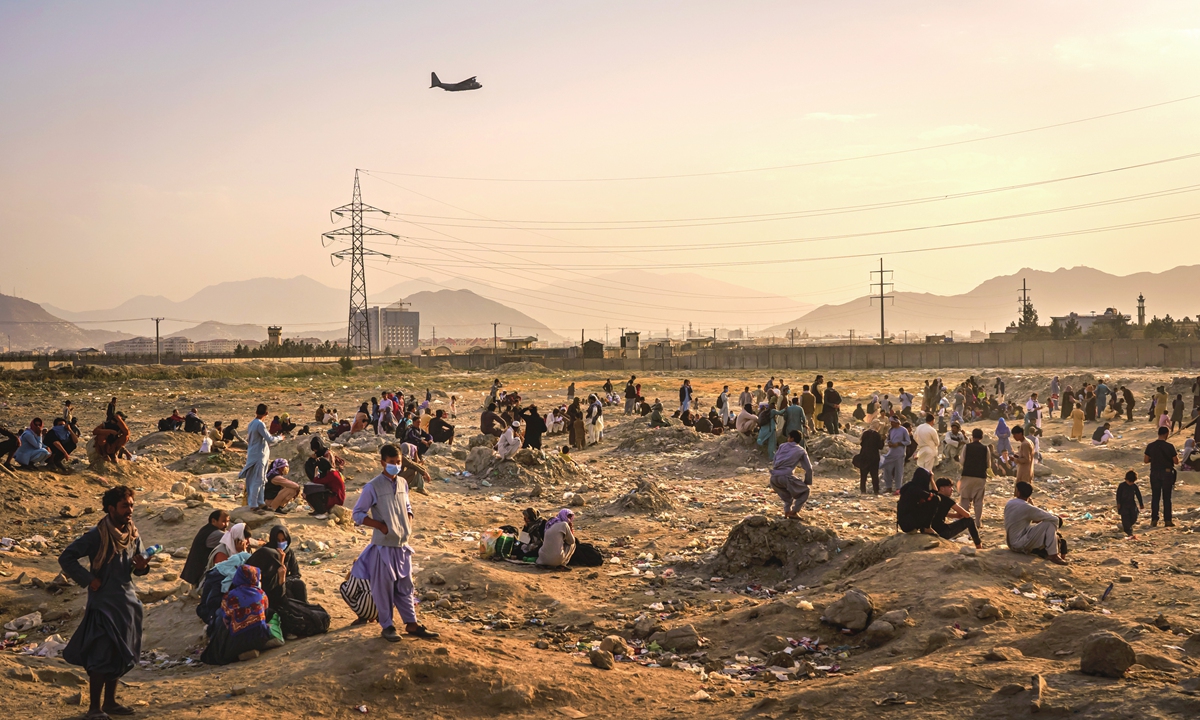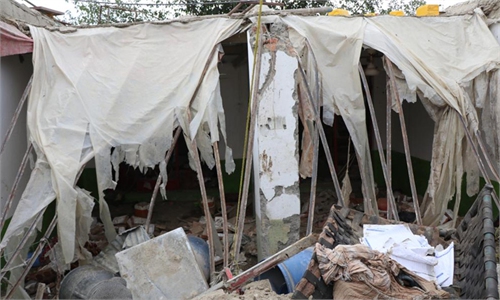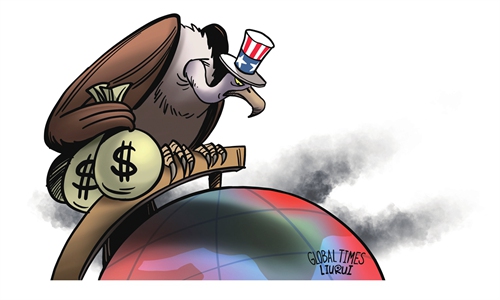
A military transport plane takes off while Afghans, who cannot get into the airport to evacuate, watch and wonder while stranded outside, in Kabul, Afghanistan, August 23, 2021. Photo: VCG
Editor's Note:
Two years into the US' hasty withdrawal from Afghanistan, the wounds inflicted on the Afghan people still linger. Life is hard - this is the common situation faced by the Afghans who have fled their own country and tried to make a living in another country. The Global Times (GT)' I-Talk interviewed three Afghans about their struggles in a foreign country.
Abdul Aziz Ibrahimi (Ibrahimi) was a journalist and is now living in Germany.
Shir Agha Safi (Safi) left Afghanistan on August 31, 2021 with the last US military flight. He is now in the US and still hasn't got a green card.
Abdul Qayum Hemat (Hemat) worked for the Canadian embassy in Afghanistan before the US withdrawal. He left Afghanistan one week before the US withdrawal. He is now in Canada.
GT: What do you think of the sudden withdrawal of the US from Afghanistan?
Ibrahimi: In those 20 years, the US and international countries came to Afghanistan. They lost thousands of soldiers and billions of dollars in Afghanistan. Afghan people also lost most of their assets. We wonder why the US came to Afghanistan and why they took over Afghanistan at that time.
We feel that we cannot trust the US and their actions toward Afghanistan and its people. We question their motives and plans for Afghanistan. It's clear now that the US doesn't seem to stand for anything concrete; it's like a facade, a show.
In the 20 years of international and US involvement in Afghanistan, we have seen all the achievements of Afghan people being removed. Where are the human rights, women's rights, freedom of speech, and media freedom that were promised during these 20 years? All national and international people are aware of the US' plans, so it's challenging for us to believe in them and trust their intentions. What benefit has the US brought to Afghanistan? They left us with nothing and now we are paying the price for their bad plans.
Safi: No one thought for one second about the Afghan, what will happen to them. And they just made a decision and withdrew the forces from Afghanistan.
Hemat: When the US suddenly withdrew from Afghanistan, it came as a surprise to the people. The responsibility for this situation lies not only with the US but also with its allied forces. However, it seems that they did not fulfill their promises. The sudden withdrawal and the subsequent events that unfolded in Afghanistan indicate a lack of proper planning and coordination.
GT: Can you recall your experience of leaving Afghanistan two years ago?
Ibrahimi: At that time, Afghanistan was in chaos as the US and international forces were withdrawing. It was August 15, 2021, and many countries were evacuating people, but the situation was very dangerous. I didn't go to the airport because it was not safe. After the entire system had collapsed, I managed to escape to Pakistan. I stayed there for two months. Then, I made my way to Turkey. On January, 19, 2022, I came to Germany.
Unfortunately, I escaped alone. It's been almost one to two years since I last saw my children. Sometimes I try to communicate with them through video calls and messaging apps, but they don't recognize me. It's heartbreaking to talk to them, and they don't know who I am. I say, "I'm your father," but they pay no attention to me. They don't know me, and it's very difficult for me to see them like this.
Safi: Leaving our country was an indescribable feeling. I departed with a heavy heart filled with a million sorrows, leaving behind everything I knew from my childhood. I had no other choice but to leave, losing everything, including our memories, dignity, freedom and sacrifices. In the US, I feel like I am just living a life without a soul.
I still have not received my green card. I have gone through the Special Immigrant Visa (SIV) and asylum processes and am currently waiting for approval for either asylum or SIV. I haven't heard anything yet. If I don't get the green card, it will be a tough and challenging decision for me to make.
GT: What do you do in the host country?
Ibrahimi: When you live in a new country, one of the first things you want to do is learn the language and understand the culture. I want to find a good job, but language is a big barrier here. First and foremost, I want to focus on learning the German language and settling my family here. In the future, I hope to have a good job.
Right now, I am focusing on learning the language and trying to find my way. It's very difficult. I'm also concerned about where to live, how to settle here with a house and car, and most importantly, how to bring my family here. It might take five years, eight years, or even 10 years to arrange everything. Most of the time, I feel confused and overwhelmed, not knowing what to do. It's a big problem.
Safi: I founded an organization called Afghan Partners in Iowa, which supports Afghan refugees in the state of Iowa. The goal is to help Afghan refugees become self-sufficient in Iowa. I am the executive director of that organization, and it is my main job now.
The most challenging part for me is witnessing the struggles of Afghan refugees and the lack of support they receive here. It's disheartening to see that there isn't enough assistance available to them. The immigration process is a major challenge. It can be very complex and confusing.
GT: What is the biggest challenge you face now?
Ibrahimi: Living in one's hometown is considered lucky and fortunate, but it's tough for a person to become a refugee and live in another country, away from their homeland. I found myself starting from zero. It feels like I lost my age, as if I went back in time. I was young when the US attacked Afghanistan. I was around 13 or 14 years old at that time. By the time I finished my university education, majoring in mathematics, and started working with national and international media, it was already 14 years of my life. However, all that progress was lost, and now I'm here, starting anew.
It's been almost two years since I've been away from my family, and it's challenging to cope with the passage of time without them. I miss my family terribly, and I'm trying to rebuild my life here in Germany. This struggle is not just mine; many other Afghan people face similar challenges. It feels like starting from scratch, like going from a hundred to zero.
Safi: Navigating the system and getting acclimated to the Westernized culture are the most difficult parts for us here. For example, when people come here, they don't even know how to cross the street because it's different in Afghanistan.
In Afghanistan, there are no traffic signals, and people can cross the road wherever they want while cars yield to pedestrians. However, in the US, everything operates according to a system where you have to wait for the signal before crossing the street. This is just one example, but there are many other difficulties they encounter, such as adapting to modern technology and various systems.
Language is also a major barrier, as many Afghans may not have a strong command of English, making it challenging for them to communicate. Additionally, they experience cultural shock due to the stark differences between Afghan and the US lifestyles and customs.
Hemat: Life in Afghanistan is comparatively easier. Everything is more affordable, and people can lead a simpler life there. Providing for basic needs is relatively straightforward. However, for Afghan people who come to countries like the US, Canada, or other European countries, starting a new life is not easy. It takes time to figure out the best way to settle and adapt. The language barrier, especially for those who have difficulty with the language, can be a significant challenge. Financial issues also make it difficult to get settled and find the right starting point.
The most challenging aspect of living in Canada for me is being away from my culture and people. In Afghanistan, I had the dream to serve my fellow countrymen. Now, being in Canada, I cannot do that. I feel a sense of detachment here.


